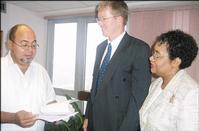
Minister of Health, John Junor (left), examines a copy of the document, 'The Economics of Tobacco Control in Jamaica: Will the Pursuit of Public Health Place A Fiscal Burden on the Government', presented to him by Dr. Corne van Walbeek (centre), tobacco control researcher, during a courtesy call at the minister's office last Thursday. Dr. Eva Lewis-Fuller, director of cooperation in international health, looks on. - Contributed
THE TAX hike on tobacco products is being hailed as a win-win strategy for the Health Ministry and the Government.
At a public forum on Friday, Dr. Corne van Walbeek, an economist and researcher at the School of Economics, University of Cape Town, South Africa, pointed out that last Thursday's 49.3 per cent hike in the special consumption tax on cigarettes and the 1.5 per cent increase in general consumption tax (GCT) would increase the overall tobacco tax burden and the price of cigarettes, which would result in a drop in consumption of tobacco products and in an increase in Government revenue.
The Health Ministry has been trying to protect non-smokers and reduce tobacco consumption in Jamaica by limiting access, helping smokers quit the habit and intervening before potential smokers start lighting up. Jamaica's Government has also signed the World Health Organisation's (WHO) Framework Convention on Tobacco Control and hopes to ratify it in the near future.
"Yesterday (Thursday) was a good day for tobacco control in Jamaica," Dr. van Walbeek said during the forum hosted by The Ministry of Health and the International Research Centre at the Jamaica Pegasus Hotel in New Kingston.
BEST TOBACCO CONTROL TOOL
However, some audience members argued that the tax increase is also a win for tobacco companies which, based on calculations from Dr. van Walbeek, have raised cigarette prices in excess of the tax hike.
Dr. van Walbeek, through the International Research Centre, worked with the Ministry of Health to conduct an analysis of the economic impact of tobacco control measures in Jamaica. The study was requested by Cabinet in order to reconsider submissions made by health officials for stricter tobacco control legislation. These include a ban on smoking in enclosed public spaces, on tobacco-related promotion, advertising and sponsorships and cigarette sales to anyone under 18 years old.
In presenting findings from a report entitled 'The Economics of Tobacco Control in Jamaica: Will the Pursuit of Public Health Place a Fiscal Burden on Government?', Dr. Walbeek said research in his country and other countries show that consumption responds to a change in price and this usually means a drop in the numbers of persons buying cigarettes.
He said studies also show that despite the current hike (which brings it up to 54 per cent), Government can comfortably increase the level of taxation to 70 per cent on tobacco products without crippling the industry.
"The best tobacco control tool is an increase in tax strategy. It's a win-win strategy. The benefits of tobacco control strategy are real and tangible," he said.
He said studies show that insisting on a smoke-free environment in businesses does not drastically cut revenue and may even be beneficial.
It is estimated that between 4,000 and 5,000 Jamaicans die from tobacco-related illnesses each year. Dr. Knox Hagley, chairman of the Coalition for Tobacco Control, notes that smoking contributes to illnesses such as cancers, heart attacks and strokes as well as to lost productivity.











